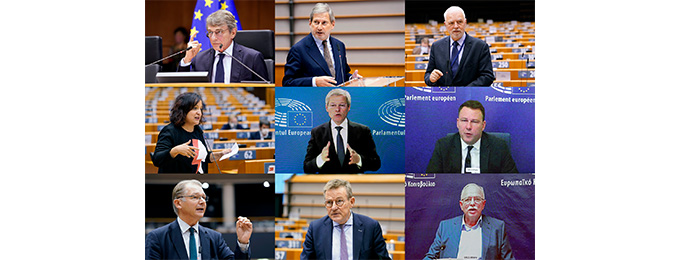The European Parliament and the German Presidency agree on a slightly higher budget. Poland and Hungary veto it over concerns about the rule of law mechanism.
After ten weeks of intense budget talks, the negotiators of the European Parliament (EP) and the German Presidency of the Council of the EU were finally able to announce on 10 November 2020 that they reached an agreement on the Multiannual Financial Framework (MFF) 2021-2027 and the Next Generation EU (NGEU) recovery instrument. The provisional political agreement adds €16 billion to the €1824.3 billion EU budget (€1’074.3 billion for MFF and €750 billion for NGEU) that the European Council originally proposed on 21 July (see SwissCore article). This compromise was reached after the EP initially insisted on adding €39 billion to the budget, including for the research, innovation and education programmes. The revised MFF/NGEU package now foresees €4 billion more for Horizon Europe, resulting in a total budget of €84.9 billion for the next research and innovation framework programme, including €5 billion from NGEU, at 2018 prices. Erasmus+ sees its budget improved by €2.2 billion to €23.4 billion. The budget for EU4Health will receive an additional €3.4 billion, tripling its previously proposed funding. The provisional budget agreement still needs to be approved by the EP and the Council.
The budget compromise between the Council and the EP was achieved in two steps: In early November, negotiators of Council and EP agreed on the introduction of a mechanism of conditionality that could allow stopping payments to Member States in case the rule of law was not respected. The second step on 10 November included the aforementioned slight increase of the EU budget. Furthermore, the EP negotiators were able to introduce a roadmap on new Own Resources into the compromise. This roadmap includes inter alia an Emissions Trading System-based Own Resource, possibly together with a carbon border adjustment mechanism, and a digital levy, both from 2023.
While the Council initially planned to swiftly move ahead to approve the provisional political agreement with the EP, the newly agreed budget compromise was vetoed by Poland and Hungary. The two countries announced already earlier in the budget discussions that they were against any conditionality with regard to the rule of law. Thus, the big question was whether Poland and – or – Hungary would risk to veto the entire budget package. The uncertainty did not last long: Already in mid-November, both countries announced their veto. The different positions were too far apart to find a solution during the meeting of the European Council on 19 November. The budget was only briefly discussed and Charles Michel, the President of the European Council, highlighted how important the new budget will be for Europe’s recovery from the COVID-19 crisis.
On 26 November, the Prime Ministers of Poland and Hungary, Mateusz Morawiecki and Viktor Orbán, stepped up their resistance to a rule of law mechanism in the EU budget legislation. In a joint statement, they announced to align their positions: Neither of the two countries would accept a proposal that would be unacceptable to the other country. Morawiecki and Orbán view a rule of law mechanism as a potential political instrument that could be used against them. Furthermore, they argue that the provisional political agreement between the EP and the Council Presidency contradicts the European Council’s Conclusions of 21 July on the EU budget. The rule of law situation in Poland and Hungary gave cause for criticism; the EC and the EP initiated Article 7(1) Treaty of the EU procedures against Poland and Hungary, respectively, and the EC’s 2020 Rule of Law Report of 30 September criticises both countries. For the EP, it is important to assure that EU countries that disrespect the rule of law will risk losing access to EU funds. Thus, the political positions are hardened as negotiations continue on the technical level.
This could negatively affect the timely start of the next generation of EU programmes. During the meeting of the research ministers on 27 November, the chairing German minister of education and research, Anja Karliczek, emphasised that the Horizon Europe legislation can only be finalised once the EU budget is agreed (see also SwissCore article). She mentioned that in addition to the budget, also the final questions related to the association of third countries to Horizon Europe and synergies with related EU programmes will still have to be settled in an additional trilogue with the EP and the EC.

